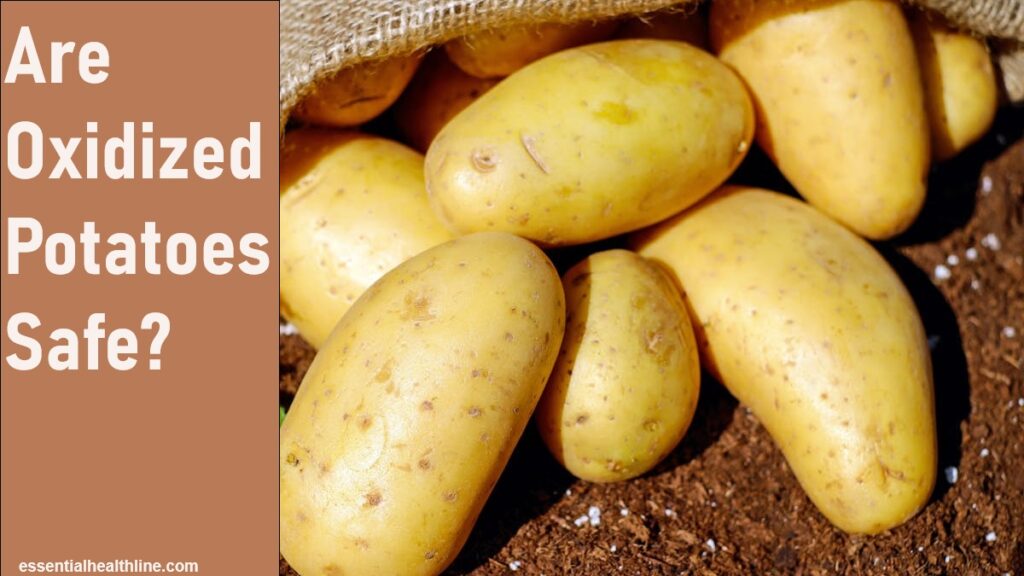Potatoes are starchy vegetables native to the United States and a staple food in most parts of the globe. While you can use them to prepare various dishes, they may turn brown or grey (oxidation) upon peeling, grating, or cutting. Are oxidized potatoes safe to eat?
Yes, oxidized potatoes are safe to eat. Due to the starch reaction with oxygen, potatoes quickly turn brown and eventually grey or black. Although the appearance is off-putting, the texture, flavor, and nutritional value remain intact.
Even so, you wouldn’t want a whole bowl of discolored potatoes, especially when preparing a good meal for your visitors.
This article covers everything you may need to know about consuming oxidized potatoes, how to prevent oxidation, and more.
Keep reading.
Are Oxidized Potatoes Safe to Eat?
Oxidized potatoes are fit for human consumption. Despite the color change that may seem distasteful, the oxidized potato plant tuber poses no health risks.
The brown, grey, or black potato is safe since it only undergoes a harmless enzymatic reaction on its surface after removing its cover. This reaction causes the potato to change color while everything else remains.
Potato peels are barriers that prevent oxidation: They block oxygen from reaching the potato’s enzyme, polyphenol oxidase (PPO). Hence, you must avoid this chemical reaction if you don’t want this change of color.
Thankfully, I have good news for you! There are simple ways to keep your white potatoes looking nice.
How Can I Keep Peeled Potatoes from Turning Brown?
Below are six ways to keep your peeled potatoes from turning brown, including the following:
- Cooking potatoes immediately after peeling
- Covering peeled potatoes with water
- Using a glass/ceramic baking dish
- Adding vitamin C
- Adding acid
- Vacuum packing
Read on.
Cooking Potatoes Immediately after Peeling
The easiest way to prevent oxidation is to peel your potatoes just before you cook them, which minimizes their exposure to oxygen, which is why they turn brown. Thus, you can prepare other ingredients first and your potatoes last.
Covering Peeled Potatoes with Water
Soaking peeled potatoes in clean, cool water significantly slows oxidation. It’s the best way of preventing potato discoloration.
Hence, peel and cut potatoes directly in water to minimize the enzyme’s contact with oxygen. Ensure that the water fully covers your potatoes.
Soak the potatoes for about two hours to remove excess starch. Rinse under running water before cooking.
Using a Glass/Ceramic Baking Dish
Certain metals can accelerate oxidation, causing potatoes to brown quickly. Hence, storing your peeled, cut, or chopped potatoes in a glass or ceramic dish is safer than using aluminum, iron, or other metal containers.
Adding Vitamin C
Vitamin C (ascorbic acid) prevents potato oxidation and maintains the white color for long durations. This method is appropriate when grating potatoes, preparing potato kugels or pancakes, or anything requiring intensive preparation with extended exposure to the air while working on the cutting board.
Add a little ascorbic acid powder to the water you intend to soak your peeled potatoes.
Ensure you rinse your potatoes thoroughly (2-3 times) with running water when cooking to remove excess starch.
Alternatively, use a bit of lemon juice. The method also reverses oxidation if there’s a slightly noticeable change.
Adding Acid
Unlike water, which slows the oxidation process, acid stops the chemical process by lowering the water’s pH. An acid prevents potato discoloration for up to 6-8 hours.
The most common acids for kitchen use are white vinegar or lemon juice. If you don’t want their flavor in your dish, spray a bit of acid on the potato directly or add a teaspoon of the two to water (about 2 liters).
Vacuum Packing
Since starch oxidation results from contact with the air, vacuum sealing your potatoes is an ideal barrier to keep the oxygen away. Peel your potatoes and pack them in an airtight container: Put them in a plastic bag and suck out all the air with a vacuum seal.
You can store them in a fridge for up to a week; they should be white and fresh. However, I suggest you avoid storing potatoes in the fridge because starch turns into sugar due to extended exposure to low temperatures.
Cook them Unpeeled
Try cooking your potatoes with their skin on whenever possible to prevent them from going brown. Though uncommon, consuming unskinned potatoes has various health benefits, as their skin contains multiple nutrients, vitamins, minerals, and fiber.
Potato skin has a high iron and potassium content, which boosts healthy metabolism and blood supply. It’s a perfect technique for cooking fresh potatoes, but you can use it for any variety.
Besides, unpeeled potatoes add a lovely flavor and texture to chips, potato salads, baked/jacked potatoes, and wedges.
Can You Peel Potatoes Ahead of Time?
Yes, you can peel your potatoes ahead of time and cook them within a day. If you cook them the next day, they’ll absorb excess water, making them watery and gritty.
Leave the raw potatoes covered in water at room temperature if you want to keep them for a few hours before cooking. Keep them in a fridge if it’ll be longer.
Peeled potatoes become dark overnight if left unsoaked in water at room temperature. Hence, you should soak them in a bowl of cold water and cover them before storing them in the fridge.
Do Cooked Potatoes Turn Brown?
No, cooked potatoes don’t turn brown. Cooked starch doesn’t react with oxygen, and your potatoes remain white after cooking.
Therefore, you can preserve your potatoes by peeling them, cutting them into cubes, cooking them, and freezing them in portions.
Boiled and mashed potatoes are better in a freezer, but you can freeze roasted ones and chips.
If you’re using an oven and find dark brown potatoes under the surface, it’s due to extended cooking time, not oxidation.
Parting Shot
Oxidized potatoes are safe to eat. Although they have an unpleasant color, they have the same flavor, nutritional value, and texture as the white (unoxidized) ones.
The good thing is that there are several techniques for preventing your peeled potatoes from turning brown, grey, or black. You can prepare them just before cooking, soak them in clean, cold water, add a little acid to the soaking water, use a nonmetallic bowl, or vacuum seal them.
You can also cook your potatoes unpeeled and enjoy the rich skin, which has various vitamins, minerals, and fiber.
When peeling your potatoes in advance, submerge them in water at room temperature for a few hours; refrigerate them if it’s more than 2 hours.
For any other queries do not hesitate to contact us.



